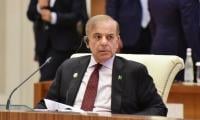ISLAMABAD: The Supreme Court on Thursday held that by not holding the intra-party elections, Pakistan Tehreek-e-Insaf (PTI) became ineligible to be allocated an election symbol, adding that they unilaterally and arbitrarily took over a political party in utter disregard of its 8,050,000 stated members.
A three-member bench of the apex court headed by Chief Justice of Pakistan Qazi Faez Isa and comprising Justice Muhammad Ali Mazhar and Justice Musarat Hilali issued a detailed judgment in the Election Commission of Pakistan (ECP) appeal, challenging the verdict of the Peshawar High Court (PHC).
The bench on January 13 had set aside the PHC order that had overturned the ECP decision revoking the cricket bat, PTI’s electoral symbol and rejecting its intra-party elections. A 34-page detailed judgment authored by Justice Isa held that the sole responsibility lies with those running the PTI affairs and did not want democracy in the party.
“They unilaterally and arbitrarily took over a political party in utter disregard of the eight hundred and fifty thousand stated members of the PTI,” the court noted, adding that because of their actions and by negating the very fundamentals of democracy, that is, not holding elections, the party suffered and was rendered ineligible to receive its election symbol. “A political party must never be deprived of its election symbol for some minor violation, but forsaking intra-party elections is a major violation of the law and of the Constitution,” said the judgment.
The detailed judgment noted that those in charge of the PTI were adamant not to hold intra-party elections and their intransigence alone deprived the party of its symbol. “If intra-party elections had been held, all benefits mentioned in the Elections Act would accrue, including the party getting its symbol,” the detailed verdict held.
The case is about intra-party elections and it would be apt to start by quoting one of the founders of a political party, a learned senior counsel who represents some of those before us, the CJP noted adding that intra-party elections should be held at every level to promote democratic culture within the party. Such elections should be held with secret ballot and the political parties should not be fiefdoms of their leaders. By introducing electoral process within the political parties, the democratic culture will be promoted, said the judgment. “There will be greater opportunity for the parties to grow and develop leadership within their own ranks. The existing ruling elite has deliberately avoided holding of internal elections of their political parties and is running them arbitrarily at the will and whims of their leaders,” it held.
The judgment held that the matter before the PHC was not with regard to the provision of a piece of paper, that is, the certificate, but whether elections had been held in the PTI. “If, intra-party elections were not held, the provision of a self-serving certificate, stating that elections were held, would be of no consequence, and would also be fraudulent.”
The PHC judgment had also disregarded the decision of the Lahore High Court in WP 287/2024, and did not await for the decision in the appeal which was preferred against it, that is, ICA 2282/2024, the court held, adding that the judgment did not mention WP 81171/2023, filed in the Lahore High Court, which was pending adjudication before a five-member bench. The detailed judgment noted that the PHC judges also disregarded the principles enunciated in Section 10 of the Code of Civil Procedure 1908 and the decision of the Supreme Court in the Salahuddin Tirmizi case.
“It is also not understandable why the Peshawar High Court in WP 5791/2021 had directed the petitioners to appear before the Election Commission of Pakistan when just twenty days later the same court held that the ECP could not do anything under the law,” it held.
The court held that if intra-party elections are not held in a political party it severs its relationship with its members and renders a party a mere name without meaning or substance. “We have restricted ourselves to inquiring and determining whether intra-party elections were at all held in PTI,” the detailed judgment noted, adding that 14 PTI party members of long standing complained to the ECP that their right, to stand as candidates and to vote, was denied.
The court noted that in the petition filed by the contesting respondents it was stated that ‘they are not members of PTI nor contestants of any intra-party elections’; however, the complainants incontrovertibly established their credentials and long association with the PTI. “Therefore, the bare denial by the contesting respondents is of little consequence. Having established one’s membership and association with a party the burden shifts to those denying it, to show that they are no longer its members, either on account of having joined another political party or because their membership has been suspended or they were expelled from the party, but nothing in this regard was brought on record, despite having repeatedly asked for it,” the judgment ruled.
In the present case, the court noted, no evidence of the complainants’ suspension or expulsion from the PTI was brought on record. On the contrary Ahmed Hassan Shah, representing Akbar S Babar, referred to a number of documents which showed Babar to be one of the founding members of the PTI. Reference was also made to a court order confirming his status as a member of the PTI.
The court noted that the filings by the contesting respondents in the PHC also do not indicate the holding of elections except a few documents which self-served the beneficiaries; thereof, nothing was filed in the apex court to suggest that intra-party elections were held.
“Our own independent analysis of the matter did not show anything which may suggest that the ECP acted in a mala fide manners,” the court noted, adding that the mala fide allegation was further dispelled when it was noted that ECP had also issued similar notices to other political parties. It held that the ECP acted in accordance with law, and it is clear from the record that the ECP did not act contrary to the law and did not act arbitrarily.
The Senator said the Chief Justice’s statement that he had received no complaint disappointed him
If this trend continues, poor consumers will have to bear an additional burden of at least Rs3.35 per unit, the power...
Maryam Nawaz on Saturday paid a visit to the Samli Syed Muhammad Hussain Government TB Sanatorium Hospital during a...
Abbasi said he had informed the PML-N leadership a year ago that he would not contest the next election from the...
Skipper Babar Azam and Fakhar Zaman stabilized Pakistan innings after early anomaly that the team faced with the...
The training primarily targeted aviation security regulatory officers and inspectors







